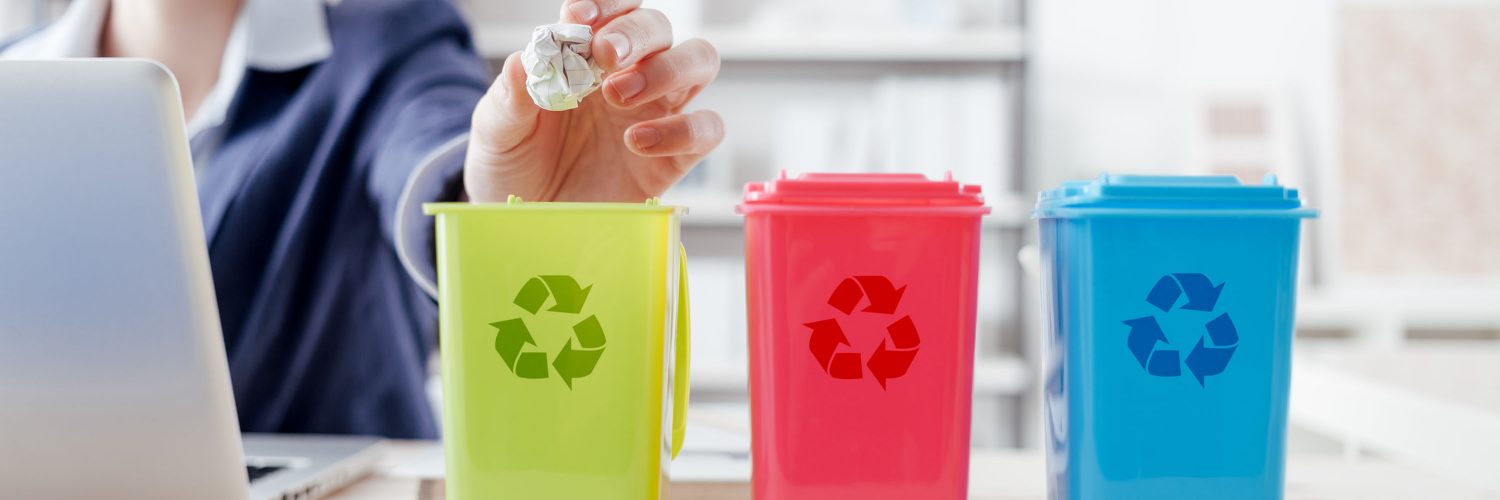Businesses

Office Recycling
Recycling is an important part of an integrated solid waste management plan. The EPA estimates that 90 percent of all discarded material in an office (by weight) is paper. If your business or agency generates used paper, then you can set up a successful office recycling program.
An office paper program can reduce disposal costs and add to a company’s bottom line. Companies with fifty or more employees can expect to generate enough volume of paper to make a collection program run efficiently. Office paper adds up quickly given that the average office worker throws away at least a half-pound of high-grade recyclable paper each day.
Small companies can still recycle; in many cases, businesses can combine efforts with other businesses located in the same building. Companies can also deliver paper and other recyclable materials to the recycling center.
Collection programs should be tailored to meet the individual needs of a business or agency, but all programs require similar approaches for start-up. Be sure to check with your top management or senior company officer to get the go-ahead to start a recycling program. Their support is crucial to your success. If you lease space in multi-tenant building ask your building management office if a recycling program exists or is being planned.
Let the Recycling Begin with a Waste Audit
Before you call your current waste hauler or a recycling company to install recycling bins and have recyclable materials picked up from your office, start by obtaining as much information as possible about the type and volume of paper your office generates on a monthly or weekly basis.
The questions in the Waste Audit will give you an overview of your company’s disposal needs. You can refer back to your answers when you are ready to start designing your program. The audit will also help you give information to a hauler who will pick up your recyclables. It’s a good idea to research the current custodial contracts that operate in your building, as custodians can be a very important link in your program.
Visual Survey
Look through a random sample of existing garbage cans on each floor of your building: list the most common types of paper found. Be sure to check different areas to compare the types of recyclable materials generated at a clerical or computer area versus a manager’s office.
The visual survey will reveal the different types of paper and recyclable materials that you will recycle. When determining the types of scrap, also consider the disposal of confidential materials. Destruction of paper often yields large quantities of recyclable paper and a few recycling companies have separate certified services for dealing with confidential shredding and recycling of this used paper. Depending on the recycling collector, you can consider extending collection to other types of materials including: corrugated cardboard, aluminum beverage cans, glass bottles and jars, and plastic bottles.
“Special Concerns”
When looking for a recycling company to pick up your materials, you should have a good idea about the type of program you would like. It’s important to have an idea of the frequency of pick-ups your office will require. It’s also important to note if your office does annual or monthly purges of files and records, since this could dramatically change the volume collected.
Confidential Document Destruction
If your company is currently having its confidential materials destroyed, try to integrate these services with your office paper recycling program. Destruction companies should provide legal certification that your document has been accurately shredded.
Many companies choose to recycle materials that are semi-confidential as a safer alternative to throwing them into the trash since the materials are destroyed in the recycling process. The semi-confidential materials can be safely kept in your office or building until the recycling company picks them up.
